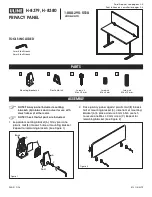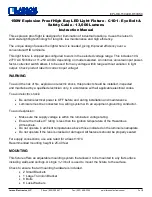
User Manual
18
Taking the standard 11mm diameter sample cup, fill it with finely
ground KBr or KCl powder. When filled, carefully flatten the top surface
of the powder with a piece of glass or polished metal, so that is level
with the top edge of the sample cup (
19
).
Raise the ellipsoid mirrors arm assembly (
4
) by the recessed finger
handle (
24
) on the Selector™ optical unit (
1
) to its up/open
Sample
Loading Position
. When the ellipsoid mirror arm assembly (
4
) has
been raised upright, it will remain in position. (See Fig 10.)
Place the KBr or KCl filled sample cup (
19
) carefully onto the top of the
sample holder post (
3
). Try to avoid any spillage of the flattened
sample powder when fitting the cup (
19
) to the post (
3
).
Lower the ellipsoid mirrors arm assembly (
4
) back to its down/closed
Operating Position
so that the height adjustment micrometer screw
(
25
) rests on the steel ball stop (
26
). (See Fig 9.) A shock absorber
(
27
) is fitted to ensure that the ellipsoid mirrors arm assembly (
4
)
comes to rest gently on the steel ball (
26
) without damaging the
micrometer (
25)
.
With the ellipsoid mirrors arm assembly (
4
) closed the beam sequence
through the Selector™ optical unit (
1
) should be completed and at this
stage some energy throughput from diffusely collected light off of the
sample surface should be observed by the spectrometers own
detection system.
Fine Alignment – Final Output Mirror (10) Adjustment
When the sample cup (
19
) with sample is in position and there is some
energy throughput being measured by the spectrometers detection
system, then fine alignment of the optics that are adjustable can be
carried out to “peak up“ the throughput signal.
Firstly, the final output mirror (
10
) should be adjusted to try and
improve the throughput signal. The “Tommy bar” supplied enables
rotational adjustment of the final output mirror (
10
). Insert the “Tommy
bar” from the front of the Selector™ accessory into the hole in the base
(
28
) of the final output mirror mount (
10
). (See Fig 9.) Carefully move
the “Tommy bar” horizontally in a left or right direction to improve the
throughput energy signal value. If the movement in one direction
















































